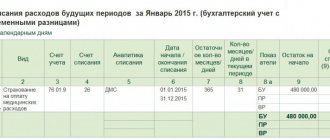Companies may have many reasons for additional, in addition to wages, material payments: the birth of an employee’s child, retirement, wedding, death of a loved one. The list of reasons for transferring funds is long.
In such a situation, accounting specialists ask themselves: should these payments be subject to insurance premiums? The Ministry of Finance of Russia, in a letter dated December 14, 2021 No. 03-15-06/109203, explained in which cases contributions will be mandatory and when they do not need to be accrued.
Who pays insurance premiums
Simple and convenient calculation of insurance premiums in the online service Kontur.Accounting!
Get free access for 14 days Any employer pays various insurance premiums every month from payments to its employees. If they work under an employment contract, then these are the contributions:
- to the Pension Fund of Russia (PFR);
- to the Health Insurance Fund (FFOMS);
- for social insurance against illnesses and injuries or maternity (in the Social Insurance Fund).
- for insurance against accidents and occupational diseases (also in the Social Insurance Fund).
Also, contributions are paid from payments to those employees who are registered with the company under civil contracts:
- to the Pension Fund;
- in FFOMS;
- for social insurance against accidents and occupational diseases, if this is specified in the contract.
We'll talk about employee contributions for pension, health, sickness and injury or maternity insurance. They are regulated by Chapter 34 of the Tax Code of the Russian Federation. Read about insurance against accidents and occupational diseases in the Federal Law dated July 24, 1998 N 125-FZ.
Legal basis
In accordance with Article 16 of the Labor Code of the Russian Federation, labor relations arise between an employee and an employer on the basis of an employment contract concluded by them in accordance with the Labor Code of the Russian Federation, as well as as a result of appointment to a position or confirmation in a position.
By virtue of Part 1 of Article 8 of Law No. 212-FZ, the base for calculating insurance premiums is defined as the amount of payments and other remunerations provided for in Part 1 of Article 7 of this Law, accrued by payers of insurance premiums for the billing period in favor of individuals, with the exception of the amounts specified in Article 9 of Law No. 212-FZ.
References in this article to Law No. 212-FZ, repealed on January 1, 2017, apply to the extent that they do not contradict the transitional provisions established by Federal Law No. 250-FZ dated July 3, 2016, that is, for periods of insurance payment contributions until 01/01/2017. From 01/01/2017, the procedure for paying insurance premiums is regulated by Chapter 34 of the Tax Code of the Russian Federation, administration and control over the correctness of payment has been transferred to the tax authorities.
Let us note that at present, control over the correctness of calculation and payment of insurance premiums for periods before 01/01/2017 is carried out by the Pension Fund of the Russian Federation, the Social Insurance Fund of the Russian Federation, since the “depth” of the check is 3 years.
Article 9 of Law No. 212-FZ establishes a list of payments that are not subject to insurance premiums for payers of insurance premiums who make payments and other remuneration to individuals.
This list includes all types of compensation payments established by the legislation of the Russian Federation, legislative acts of the constituent entities of the Russian Federation, decisions of representative bodies of local self-government (within the limits established in accordance with the legislation of the Russian Federation) related to the performance of labor duties by an individual (subparagraph “and” paragraph 2 of part 1 of this article of the Law).
Since Law No. 212-FZ does not contain a definition of compensation payments related to the performance of labor duties, this term is used in the sense that labor legislation gives it.
Article 129 of the Labor Code of the Russian Federation establishes that wages (employee remuneration) are remuneration for work depending on the employee’s qualifications, complexity, quantity, quality and conditions of work performed, as well as compensation payments (additional payments and allowances of a compensatory nature, including for work in conditions deviating from normal ones, work in special climatic conditions and in areas exposed to radioactive contamination, and other compensation payments) and incentive payments (additional payments and incentive allowances, bonuses and other incentive payments).
According to Article 164 of the Labor Code of the Russian Federation, compensations are monetary payments established in order to reimburse the employee for costs associated with the performance of labor or other duties provided for by the Labor Code of the Russian Federation and other federal laws.
Additional guarantees may be established by the Labor Code of the Russian Federation, other federal laws, regulatory legal acts of constituent entities of the Russian Federation, local government bodies or the employer.
By virtue of Article 8 of the Labor Code of the Russian Federation, the employer adopts local regulations containing labor law norms, within its competence in accordance with laws and other regulations, collective agreements, agreements; these local acts, by virtue of Article 5 of the Labor Code of the Russian Federation, are included in the system of labor legislation.
That is why the courts take the position that social payments based on a collective agreement or other local regulatory act of the employer, which are not stimulating, and do not depend on the qualifications of workers, complexity, quality, quantity, conditions of the work itself, are not remuneration for workers ( remuneration for labor), including because they are not provided for in employment contracts; however, these payments fall within the scope of subparagraph “e” of paragraph 2 of part 1 of Article 9 of the Law and are not subject to inclusion in the base subject to insurance contributions.
Below we will analyze individual situations when payments and other remunerations accrued by insurance premium payers are not subject to insurance premiums.
Payments subject to insurance premiums
Insurance premiums are levied on payments to employees based on labor relations and in accordance with civil contracts for the performance of work, provision of services and copyright orders.
Payments for which contributions are not paid are listed in Art. 422 Tax Code of the Russian Federation:
- State and social benefits;
- Compensation payments upon dismissal, payments for damages, payment for housing or food, payment for sports or dress uniforms, provision of allowances in kind, etc.;
- Prizes, additional payments to the pensions of former employees and scholarships under student contracts;
- Field allowance;
- Amounts of one-time financial assistance, for example, upon the birth or adoption of a child, upon the loss of a family member, during a natural disaster and other emergency circumstances;
- Income, in addition to wages, received by members of indigenous communities from the sale of traditional craft products;
- Insurance payments for compulsory and voluntary personal insurance;
- Payment for employee training related to professional needs;
- Other compensation and payments.
In the Kontur.Accounting web service it is easy to calculate and account for contributions and generate payment orders.
Social payments
In the commentary letter, the department noted that an exhaustive list of payments that are not subject to contributions is established in Article 422 of the Tax Code of the Russian Federation.
The Ministry of Finance further listed several reasons why organizations can transfer money to employees, while clarifying that these payments are subject to insurance premiums in the general manner. Here is a list of possible reasons for transferring funds to an employee that were transferred by the department:
- one-time bonus upon retirement;
- one-time incentives in connection with holidays and anniversaries;
- reimbursement of fees for children in preschool institutions;
- one-time remuneration upon hiring of employees under the age of 35;
- partial compensation to employees for the cost of vouchers;
- payment for food for donors on the days of blood donation;
- additional payment to employees during his wife’s maternity leave;
- monthly additional allowance for child care up to three years of age.
Subscribe to the magazine “Calculation” or “Calculation. Premium" for the 1st half of 2021!
Limit base for calculating insurance premiums
Simple and convenient calculation of insurance premiums in the online service Kontur.Accounting! Get free access for 14 days
Contributions to the Pension Fund and the Social Insurance Fund are limited by the maximum bases for calculating contributions, which are annually indexed based on the growth of average wages:
The maximum base for contributions to the Pension Fund in 2021 is 1,292,000 rubles.
The maximum base for contributions to the Pension Fund in 2021 is 1,465,000 rubles.
The maximum base is calculated based on the employee’s income on an accrual basis. As soon as his income for the year reaches the maximum base, future contributions must be paid according to new rules. When paying contributions at the basic tariff, if this base is exceeded, contributions are paid at a reduced rate - 10%. If the organization is on a reduced tariff, then if it is exceeded, contributions are not paid.
The maximum base for contributions to the Social Insurance Fund in 2021 is 912,000 rubles.
The maximum base for contributions to the Social Insurance Fund in 2021 is 966,000 rubles.
If the base is exceeded, then there is no need to pay contributions.
For contributions to compulsory medical insurance and injuries, a maximum base is not established, therefore all income received by the employee is subject to contributions.
Changes
Art. 422 of the Tax Code of the Russian Federation did not change in 2021 due to the pandemic, although some relaxations in terms of payment of insurance premiums are still provided for by the state for some payers.
In general, this norm provides a closed list of payments that are not subject to contributions, which, according to the code, is not subject to broad interpretation. However, disputes regularly arise regarding the income included in the item, and the tax office provides clarifications on them.
At the same time, amendments to Art. 422 of the Tax Code of the Russian Federation are not yet planned. Separate changes were provided in connection with the popular vote on amendments to the Constitution (payments to members of election commissions were included in non-taxable payments). These rules apply to legal relations that arose after 03/01/2020. and become invalid as of 01/01/2021.
A new law has not yet been planned, especially since the chapter on insurance premiums was only recently moved to the Tax Code of the Russian Federation.
Insurance premium rates in 2021 and 2021
Simple and convenient calculation of insurance premiums in the online service Kontur.Accounting! Get free access for 14 days
Let's look at the main rates of insurance premiums for employees in 2020 and 2021. They remain unchanged:
- For compulsory pension insurance - 22%.
- For compulsory health insurance - 5.1%.
- In case of temporary disability and maternity - 2.9%;
- For injuries - from 0.2% to 8.5%, depending on the occupational risk class assigned to the main type of activity performed.
The table shows special reduced contribution rates for certain categories of payers established in 2021 and 2021.
| Insured category | on OPS, % | on compulsory medical insurance, % | at VNiM, % | General tariff, % | Pension Fund from amounts above the base, % |
| Basic tariff, no benefits | 22 | 5,1 | 2,9 | 30 | 10 |
| Tariff for SMEs with payments above the minimum wage | 10 | 5 | 0 | 15 | 10 |
| IT organizations of the Russian Federation that develop and sell computer programs and databases, as well as install, test and maintain them (from 2021) | 6 | 0,1 | 1,5 | 7,6 | — |
| Residents of a technology-innovation or tourist-recreational special economic zone | 8 | 4 | 2 | 14 | — |
| Participants of the Skolkovo project | 14 | 0 | 0 | 14 | — |
| Employers who pay wages and benefits to crew members of Russian ships. Only in relation to payments to ship crew members | 0 | 0 | 0 | 0 | — |
| Non-profit organizations on the simplified tax system in the field of social services, science, education, healthcare, culture, art or mass sports | 20 | 0 | 0 | 20 | — |
| Charitable organizations on the simplified tax system | 20 | 0 | 0 | 20 | — |
| Participants in the free economic zone of Crimea and Sevastopol | 6 | 0,1 | 1,5 | 7,6 | — |
| Residents of the territory of rapid socio-economic development | 6 | 0,1 | 1,5 | 7,6 | — |
| Residents of the special economic zone in the Kaliningrad region | 6 | 0,1 | 1,5 | 7,6 | — |
| Residents of the free port of Vladivostok | 6 | 0,1 | 1,5 | 7,6 | — |
| Creators of cartoons, video and audio productions | 8 | 2 | 4 | 14 | — |
In 2021, most employers on the simplified tax system will pay contributions at a general rate of 30%, as the transition period has come to an end. Until 2024, charitable and non-profit organizations using the simplified tax system will be able to use a preferential rate of 20%.
Since 2021, several more categories of policyholders have switched to basic tariffs:
- business companies and partnerships that apply or implement the results of intellectual activity, the rights to which belong to their participants or founders - budgetary or autonomous scientific institutions or educational institutions of higher education;
- organizations and entrepreneurs that carry out technology-innovation activities and pay employees working in technology-innovation or industrial-production special economic zones;
- organizations and individual entrepreneurs who have entered into an agreement on the conduct of tourism and recreational activities, which pay employees conducting these activities in special economic zones.
From 2021, these categories pay contributions at the general rate - 30%, and if the maximum base for calculating contributions to compulsory pension insurance is exceeded, the payment is not canceled, but the percentage of contributions to the Pension Fund is reduced to 10%.





